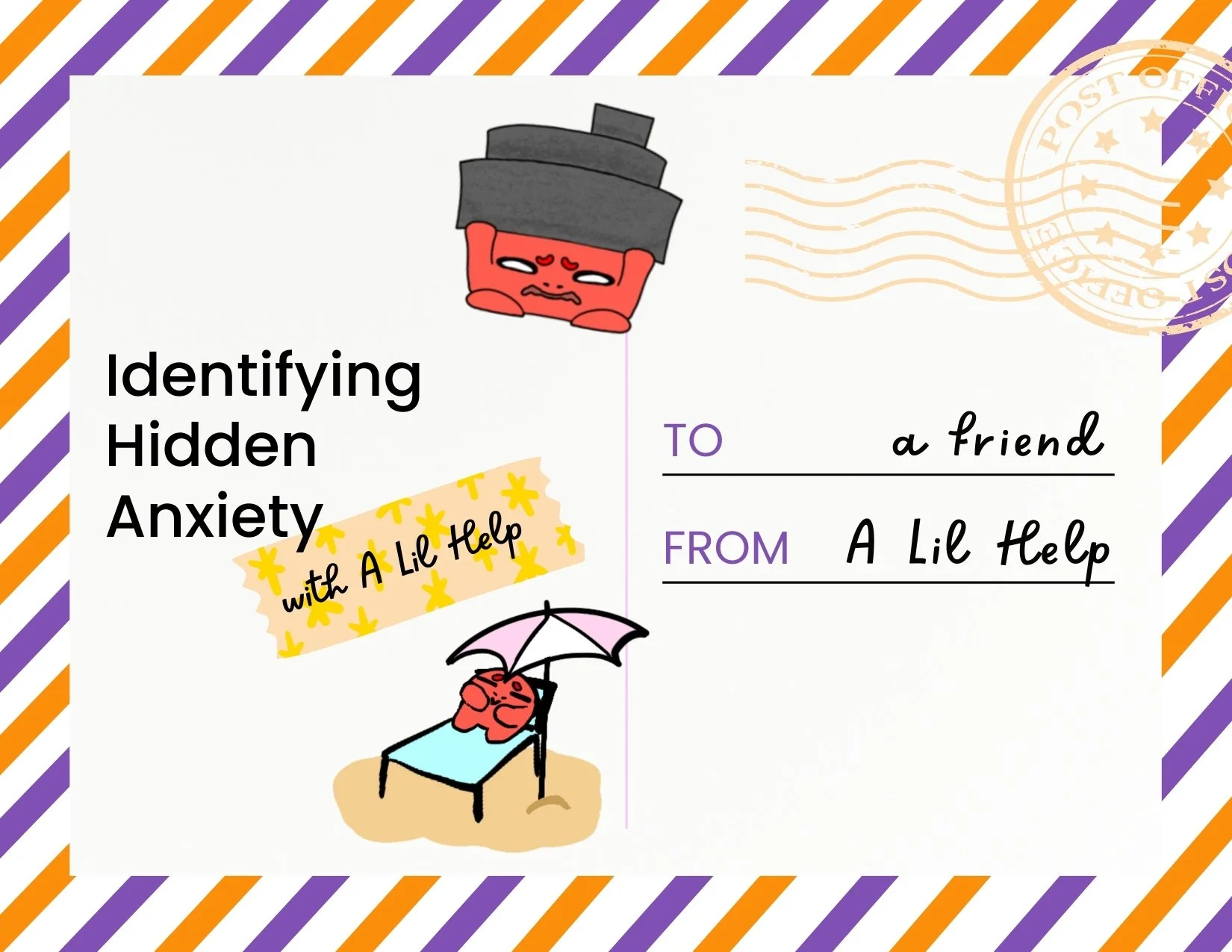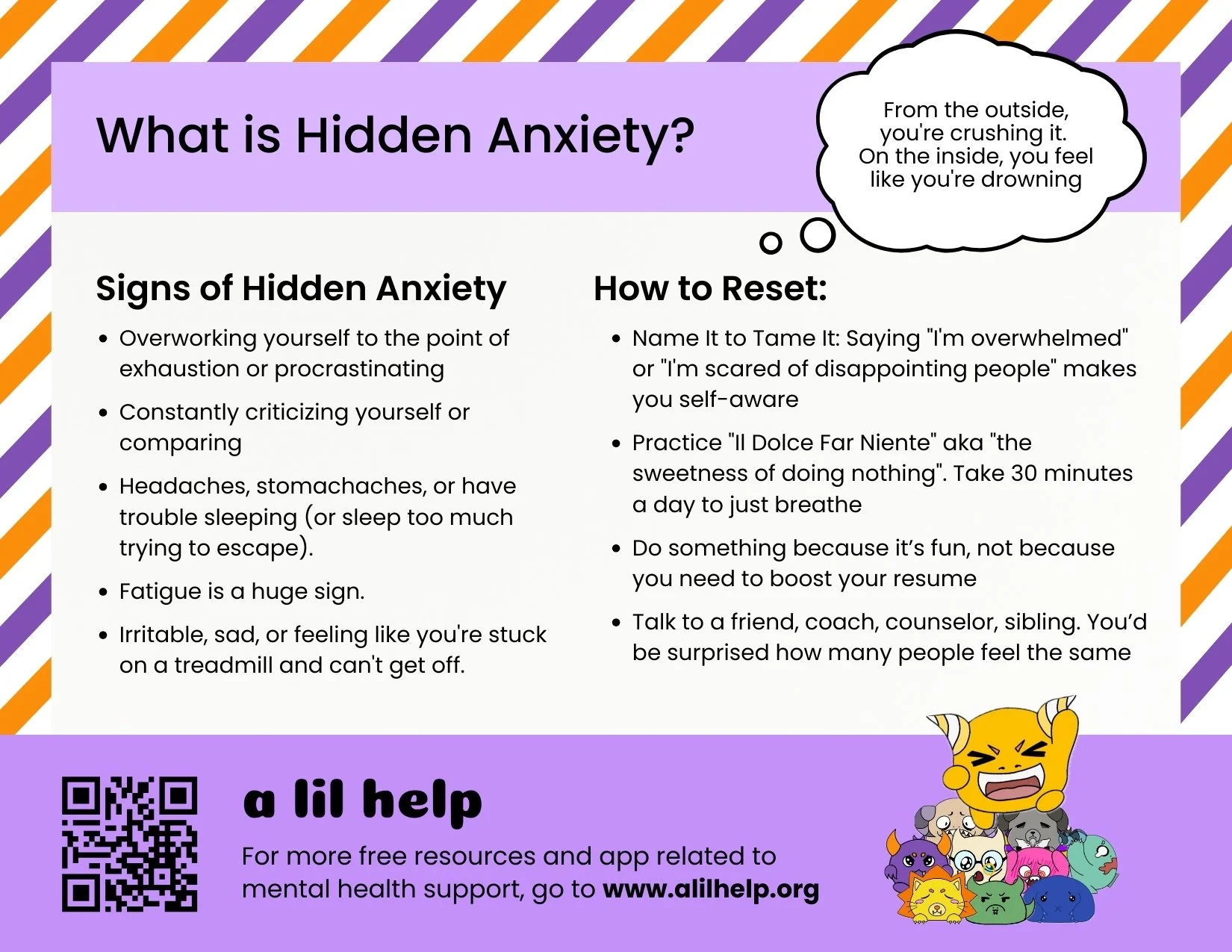

Remember
Anxiety is a very common thing and it is important to remember that it is important to take breaks and you always have someone to talk to whether it’s your family or friends
What Is Hidden Anxiety and Self-Pressure?
Written by Stella V. Wong
Picture this: You're sitting in class with a smile on your face, nodding along like everything's fine. Your Instagram shows you at sports practice, hanging with friends, looking like you've got it all together. But last night? You were up until 2am finishing an essay, your stomach hurt all day from stress, and you can't remember the last time you felt actually relaxed. From the outside, you look like you're crushing it. On the inside, you're drowning. If this sounds familiar, you're definitely not alone. So many students are walking around with what's called “hidden anxiety.”
What is Actually Going On Here?
Let's break down the vocab real quick:
Hidden Anxiety is when you look put-together on the outside but feel like a shaken soda bottle on the inside. Lots of high-achievers do this because they feel pressure to perform academically, socially, and personally… and they don’t want anyone to know how hard it really is.
The scary part? Because you look fine, people assume you are fine, and the weight just keeps piling on.
Why does this happen?
The pressure to perform comes from everywhere. Maybe your parents have high expectations, your teachers pile on the workload, your teammates are counting on you, or you're scrolling through social media watching everyone else seem perfect and successful. There's this unspoken cultural or societal message that you need to be great at everything: ace your classes, excel in sports or clubs, have an active social life, get into a good college, and oh yeah, make it all look effortless. This is not bringing into play beauty standards and clothing choices. “Succeed at all costs.”
A lot of students are also people-pleasers who are terrified of disappointing anyone or being seen as weak or struggling. We've been taught that asking for help or admitting you're stressed means you're not tough enough, not smart enough, or just... not enough. So instead of talking about it, you mask it. You work harder, sleep less, and keep smiling even though you're one bad grade away from a breakdown. The problem is, your body and brain can only take so much before they start sending signals that something's wrong.
Myth Buster Alert
✖️Myth: If you’re struggling, you’re weak.
✔️Fact: Everyone struggles sometimes. Seeking help is a strength.
Why This Actually Matters
The signs of hidden anxiety can show up in sneaky ways:
You might be overworking yourself to the point of exhaustion, or ironically, procrastinating on everything because the fear of not doing it perfectly makes it impossible to start.
You're constantly criticizing yourself or comparing your behind-the-scenes to everyone else's highlight reel.
Physically, you might get headaches, stomachaches, or have trouble sleeping (or sleep too much trying to escape).
Fatigue is a huge sign. That’s when you sleep for at least 8 hours but wake up feeling tired, or have trouble even getting out of bed. People (aka your own critical voice) might even mistakenly call it lazy.
Emotionally, you feel irritable, sad, or like you're stuck on a treadmill you can't get off.
If this keeps going without being addressed, it leads to serious burnout, which is when you are so emotionally exhausted, you start isolating from friends, and you lose interest in things you used to love. Over time, this can develop into actual anxiety or depression. Here's the truth bomb: pushing through and “toughing it out” isn't strength. It's just delaying the inevitable crash.
How to Actually Deal
The good news? You don’t have to keep the act up. The first step is actually simple: notice how you feel and admit it to yourself. Naming emotions doesn’t make you weak. It makes you self-aware.
💜 “I'm stressed.”
💜 “I'm overwhelmed.”
💜 “I'm anxious about disappointing people.”
Talking to someone you trust (a friend, counselor, coach, sibling, or whoever feels safe) can help more than you’d expect. You'd be shocked how many people feel the same way and are just waiting for someone else to be honest first.
Set realistic goals, celebrate the small wins, and try stress relievers like journaling, movement, mindfulness, or just doing something you enjoy. Make time for hobbies and activities that aren't about achievement or performance, or resume building: things you do just because they make you feel good. Or just take 30 minutes to breathe and do nothing. Italians have a phrase for it – il dolce far niente.
The Bottom Line
Hidden anxiety might be common, but it doesn't have to be your norm. You deserve to feel okay, not just look okay.
DISCLAIMER: This article is for informational and educational purposes only, from publicly available information. It is not medical or professional advice. If you’re struggling, talk to a trusted adult, counselor, or healthcare professional.
